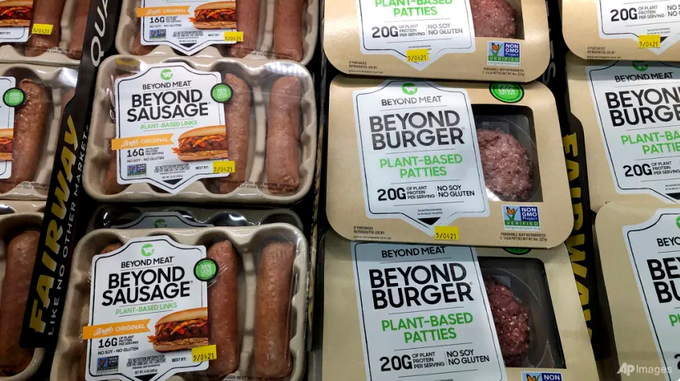June 20, 2025 | 17:51 GMT +7
June 20, 2025 | 17:51 GMT +7
Hotline: 0913.378.918
June 20, 2025 | 17:51 GMT +7
Hotline: 0913.378.918

Plant-based food maker Beyond Meat has been hit hard and has planned for job cuts. Its shares have sunk by about 75 percent this year. Photo: Richard Drew/AP
Serving up classic burgers and sides but with untraditional plant-based ingredients, fast food joint Marty’s V Burger has amassed a cult following in New York City over the years.
The eatery, started by former commercial and charter pilot Marty Krutolow several years ago, offers completely vegan and plant-based options.
“We do burgers, we have five different kinds of fries, we have drumsticks, mac and cheese, cajun cheesy pepper steaks. So we’re the quintessential fast food,” said Mr Krutolow.
“In the beginning, when Beyond Meat and Impossible Foods launched, the buzz was out there and people were like, ‘Where can we get this?’. And we were one of the few places that carried their products.”
Plant-based meat alternatives have grown in popularity in recent years as more people look to cut back on meat, but rising inflation could sour the appetite of consumers.
Prices for plant-based meat remain more expensive than animal products, observers pointed out, and with less money in their pockets, consumers are finding meat substitutes less attractive.
In recent weeks, investors have been taking a bite out of plant-based protein brand Beyond Meat’s stock, on fears that the demand for meat substitutes is starting to slow.
It's a trend seen across the sector, and also a concern for some dairy milk alternative brands.
COOLING PLANT-BASED FOOD SALES
Mr Arun Sundaram, vice president of equity research at CFRA Research, said the rate of new consumer adoption has slowed.
“It’s largely down to a lot of these macro things that we’ve been seeing, like high inflation, high interest rates, that’s been slowing the rate of consumer adoption right now,” he added.
In 2020, sales of plant-based food in the United States jumped 27 percent compared to the year before, pushing the market value of the wider sector to around US$7 billion.
However, sales have cooled in recent months.
Plant-based food maker Beyond Meat, for instance, has been hit hard and has planned for job cuts. Its shares have sunk by about 75 percent this year.
But Beyond Meat’s new partnership with fast food chain Taco Bell could increase the brand’s exposure and help boost its sales, said analysts.
REPOSITIONING AS PROTEIN ALTERNATIVE
Some believe these businesses should position themselves as a protein alternative, rather than a direct substitute for meat.
Professor Priya Raghubir of the New York University Stern School of Business said: “If it’s repositioned in an appropriate manner, with appropriate reference to taste expectations, it can live alongside tofu.”
Meanwhile, plant-based milks are not immune from headwinds facing the broader sector, said experts.
While it is a more established market, investors fear inflation could hurt sales for brands such as Oatly. The oat milk company has seen its shares slide more than 80 per cent from the highs that it hit last year.
“The rate of new consumer adoption for plant-based milk is slowing down because of high inflation, but existing customers who have already adopted ... are not really those turning away and buying animal milk,” said Mr Sundaram.
Despite the plant-based market facing a slip in demand after years of growth, industry observers are confident that an appetite for these products is here to stay.
(CNA)

(VAN) Poultry production in Poland, which has only started recovering from devastating bird flu outbreaks earlier this year, has been hit by a series of outbreaks of Newcastle disease, with the veterinary situation deteriorating rapidly.

(VAN) Extensive licensing requirements raise concerns about intellectual property theft.

(VAN) As of Friday, a salmonella outbreak linked to a California egg producer had sickened at least 79 people. Of the infected people, 21 hospitalizations were reported, U.S. health officials said.

(VAN) With the war ongoing, many Ukrainian farmers and rural farming families face limited access to their land due to mines and lack the financial resources to purchase needed agricultural inputs.

(VAN) Vikas Rambal has quietly built a $5 billion business empire in manufacturing, property and solar, and catapulted onto the Rich List.

(VAN) Available cropland now at less than five percent, according to latest geospatial assessment from FAO and UNOSAT.

(VAN) Alt Carbon has raised $12 million in a seed round as it plans to scale its carbon dioxide removal work in the South Asian nation.